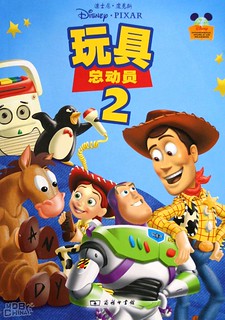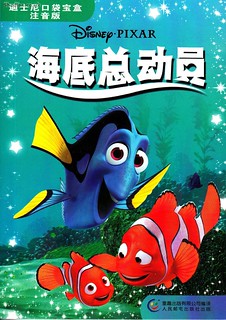The Laziest Animated Movie Title Translations Ever
I remember when I first moved to China, I used animated films to practice Chinese quite a bit. I quickly discovered that Disney did an especially good jobs with translating (my favorite was the Chinese version of The Emperor’s New Groove). But I also started noticing something strange about a lot of these animated films’ Chinese titles… the word 总动员 appeared, somewhat inexplicably, way too often.
What is 总动员?

It was almost like a formula. In one word, what’s the movie about? That’s the main theme. Then just apply this formula:
[main theme] + 总动员
What was going on? I asked a number of native speakers abut this phenomenon, and none of them had paid the issue much notice. One bit of helpful information they did give, however, was that the word 总动员, in mainland China, is tied in the minds of many to some popular variety shows that came out around the year 2000. Specifically, they were 欢乐总动员 (“Joyous Zongdongyuan“) and 全家总动员 (“Whole Family Zongdongyuan“). Both were loud, fun, programs with lots of active people.
Pleco‘s dictionaries give the following definitions for 总动员:
- General/total mobilization
- General (or total) mobilization
- General mobilization (for war etc)
OK, obviously those aren’t the meanings they’re shooting for in the titles of cartoon movies.
Native speakers seems to have trouble giving an exact definition of this use of 总动员, but the feeling is clear: exciting, happy, lively, 热闹, with lots of people.
The Rise of 总动员
Not appearing in dictionaries did not stop this word from popping up in animated feature titles all over the place, starting shortly before 2000. Many were Disney films, but not all:

- Toy Story, Toy Story 2, Toy Story 3 (1995, 1999, 2010) 玩具总动员: “Toy Zongdongyuan“
- Joe’s Apartment (1996) 蟑螂总动员: “Cockroach Zongdongyuan“
- Finding Nemo (2003) 海底总动员: “Bottom of the Sea Zongdongyuan“
- Looney Tunes: Back in Action (2003) 巨星总动员: “Megastar Zongdongyuan“
- The Incredibles (2004) 超人总动员: “Superman Zongdongyuan“
- Cars, Cars 2 (2006, 2011) 赛车总动员: “Race Car Zongdongyuan“
- Ratatouille (2007) 美食总动员: “Gourmet Zongdongyuan“
- Bee Movie (2007) 蜜蜂总动员: “Bee Zongdongyuan“
- WALL·E (2008) 机器人总动员: “Robot Zongdongyuan“
- Planes (2013) 飞机总动员: “Airplane Zongdongyuan“
- Free Birds (2013) 火鸡总动员: “Turkey Zongdongyuan“
- Minuscule: Valley of the Lost Ants (2014) 昆虫总动员: “Ant Zongdongyuan“
This is not a complete list; rather, it’s an attempt to try to capture some of the biggest titles and the range that “zongdongyuan” covers.

OK, some of these seem to work OK… Specifically, Cars seems to deserve the treatment. I can’t help but feel that “Gourmet Zongdongyuan” (Ratatouille) could have been a much better title, though, as could have “Robot Zongdongyuan” (WALL·E).
To be fair, most of these movies actually do have multiple titles, and a casual check seems to indicate that the translators over in Taiwan are putting a bit more thought into the translations of animated feature film titles. Still, I’ve been seeing these zongdongyuan translations for years, and it especially stands out for Disney films, which tend to have excellent translations for the actual movies themselves, despite the total cop-out titles.
The Fall of 总动员
I was thinking the linguistics nerds like me were the only ones that gave this kind of issue any consideration, but fortunately at least some Chinese movie fans are also getting fed up:
最烦动画电影的中文翻译!动不动就什么什么总动员,总动员个屁呀!!有点技术含量行不行,不会翻译就直接用英文名也比这个好吧,都是文化人,怎么那么俗啊?这几年的电影都被总动员了,汽车、玩具、海底、美食、机器人,你知道什么是总动员不?我了个呸!!!!!看见这么二货的翻译就来气,这么好的电影弄了个蹩脚翻译!气死我了!想起来就来气。。。
A rough translation:
I’m so annoyed by the Chinese translations of animated films. It’s just this zongdongyuan, that zongdongyuan… screw zongdongyuan! Can’t you have just a bit of skill? If you don’t know how to translate, directly using the English title is better than this. You’ve all got culture, but now why so crude? In recent years all movies have been zongdongyuan-ized: cars, toys, bottom of the sea, gourmet food, robots… Do you even know what a zongdongyuan is? Bloody hell! When I see a shoddy translation like this it sets me off. How can such a good move have such a lame translation? I’m so pissed off! I get mad just thinking about it…
Anyway, the good news (for us translation purists) is that in recent years zongdongyuan seems to have worn out its welcome, and quite a few animated movies (including Disney/Pixar films) that almost certainly would have gotten zongdongyuan-ized 5 or 10 years ago did not: Brave, Tangled, A Bug’s Life, Madagascar, Rio, Up, Happy Feet (not 企鹅总动员!), Turbo, Mr. Peabody & Sherman, Despicable Me, The Croods (疯狂原始人, “crazy primitive men” rather than 原始人总动员!)… all escaped zongdongyuan-ization. (Whether or not those films’ titles have good Chinese translations, though, is another question… but at least they’re not quite so lazy.)
So did anyone else notice this lazy translation trend, or was it just me?

Hmmm, I just realized it’s April Fools’ Day. Sorry, this post isn’t a joke. 😛
W says it’s just a marketing label equivalent to “extravaganza”, probably no more outrageous than the US’s use of orange and blue.
This anti-translation of the titles of cultural products is endemic in China and elsewhere from everything from books to movies to whatever else can be sold. It really doesn’t have much to do with translation or foreign products in all cases.
One of the more noteworthy ones is the entire Django phenomenon which kind of got addressed (in movie) and in commentary about the movie Django Unchained. You can read about that lotsa places online.
http://en.wikipedia.org/wiki/Django_(character)
And I mean, for mindless westerns and kids movies with groundbreaking and deep titles like “Toy Story” should we care if we just get zongdongyuan or Django xyz or 王牌 (for any and all Jim Carrey movies, even applied retroactively, based off of the Ace Ventura series?) It’s basically the equivalent of putting XYZ: A Jack Ryan Thriller subtitle on books and movies, which they’ve started to do.
Anyway, these aren’t really translations in even the loosest sense. When they used to switch the names of Japanese anime characters for Hiramaki to Billy, was that really a translation? It was more like, we’re not giving kids a name that looks furreign, period. That’s not so much necessarily a translation decision as a decision from the powers that be up above saying, “names in this series must be dumb english names, period.”
And since we’re on the topic of anime, and to give another example of non-translation “laziness,” the Super Dimension Trilogy, of which people may, doubtfully, know as the “inspiration” of Robotech, was basically three unrelated animated series that just all happened to have the same title, “Super Dimension xyz,” because some toymaker, Sunrise, and the animation studios figured it would be easier to sell more toys that way if they made some brand, regardless of whether the items in that brand actually connected in any real way.
If you go look up lots of “good” translations of titles of movies and books from back in the day, from Taiwan or China, many of them are still unrelated to the original title or the book in any meaningful way, and many are so pretty and intellectual that you’ll probably have to check a dictionary, or chengyu dictionary to understand or say them, and I suspect many regular chinese people back in the day had the same problem as well, which is kinda not what you want on a movie marquee or in a bookstore. I’m not sure zongdongyuan is better or worse than the old times. Sequels and series are safer bets. Even the famed Pixar people just seem to have given up and are cranking out Cars 2, 3 and whatever now. Why create original new IP when you can make the Incredibles over and over again and never have to come up with original or new ideas?
I live in Hong Kong and we don’t have the zongdongyuan problem, but qibing 奇兵, equally annoying. Nemo: 海底奇兵, Toy Story: 反斗奇兵… I think it all came from the transcription of Indiana Jones of 奪寶奇兵 where it became famous.
Oh and also that qiyuan 奇緣 is now on the rise! Frozen:魔法雪奇緣, Tangled:魔法奇緣. Annoying. And so I always opt for the English version.
Cool blog! And sorry I can’t type simplified Chinese on my cell. Cheers 🙂
Translation talk is fun.
Really though when it comes to the gratuitous amount of poor English translations throughout the mainland this 总动员 issue is the tip of a colossal iceberg.
as a chinese i can tell u that when translating these titles the translators are always looking for words to briefly yet perfectly represent the feel and main theme of the film, ,zongdongyuan just easily gives the feel of mayhem plus light mooded actions that these kind of cartoons always have, it makes much more sense to, for example tl Cars cars into “cars zongdongyuan” than titles like “汽车,汽车”, which will give ppl the feeling that this movie will be about serious introductions of how cars are taking over the world and how many and everywhere they are, the same goes for other titles, its just the unique feel these cartoons have made tl.tors opt for the word zongdongyuan
[…] mentioned before that American animated films in China have some of the “laziest translations ever,” blatantly overusing the words 总动员 and 疯狂. In this article I want to talk about another […]